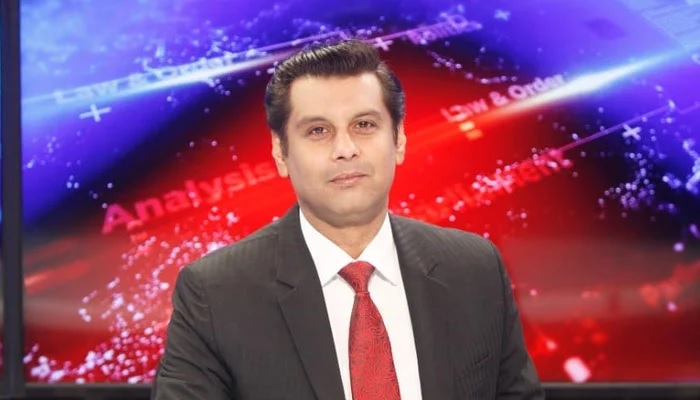Arshad Sharif murder case: Kenya didn't let JIT access evidence, SC told
SC orders probe against elements involved in disclosing fact-finding committee's report in Arshad Sharif murder case
The joint investigation team (JIT) probing Pakistani journalist Arshad Sharif's murder was denied access to evidence by the Kenyan authorities, the chief of the probe team informed the Supreme Court during the hearing of a suo motu case on Monday.
Last year, the apex court had taken suo motu notice of the assassination of Arshad Sharif in Kenya. The murder was termed as a "case of mistaken identity" by the country's authorities.
A five-member bench, headed by Chief Justice of Pakistan (CJP) Umar Ata Bandial, resumed hearing the suo motu case today (Monday) after over a month-long adjournment.
The other bench members included Justice Ijazul Ahsan, Justice Sayyed Mazahar Ali Akbar Naqvi, Justice Jamal Khan Mandokhail and Justice Muhammad Ali Mazhar.
At the outset of the hearing, JIT formed by the federal government submitted its second progress report to the SC.
Meanwhile, the apex court directed the authorities to hold a probe against the elements involved in disclosing the fact-finding committee's report in the case of the senior journalist's murder.
During the hearing, CJP Bandial questioned who made the fact-finding report public and directed to find out who was behind it.
"The fact-finding report was made public without any verification," the CJP remarked, questioning whether it was done deliberately. He said that there have been mistakes in the investigation carried out in Pakistan.
The chief justice added that no one can be accused of the murder as of yet.
Justice Naqvi remarked that the court has read every single word of the report.
"Have you done what was assigned to you?" Justice Naqvi asked the JIT. He questioned whether the team found any material related to the murder in Kenya.
At this, JIT chief Owais Ahmed replied that they met officials in Kenya, adding that the East African country did not grant access to evidence.
"We did not find any concrete material in Kenya regarding Arshad Sharif's murder," he added.
"Where is Arshad Sharif's mobile and other equipment?" questioned Justice Ahsan.
At this, the JIT chief said that Sharif's mobile phone and iPad are with Kenya's IT department. However, the rest of his belongings have been received, he added.
The additional attorney-general said that Kenya did not cooperate in the murder investigation.
At this, Justice Ahsan asked how a country can seek cooperation with an investigation if relations with that nation are not that good.
"Kenya is an independent country and doesn't come under our jurisdiction," said the chief justice.
The court wants to know what the special JIT has found so far, said the CJP. "What will be the special JIT's strategy in future?" he asked.
The chief justice added that no one can be accused of the murder as of yet.
During the hearing, Justice Mazhar remarked that the Kenyan foreign ministry had assured the Foreign Office of cooperation with the JIT.
"Why wasn't the special JIT allowed to go despite the surety?” he asked.
The additional attorney-general said that it was a "complicated matter" as Pakistani authorities had to keep diplomatic relations with Kenya.
‘Three aspects in murder case’
Meanwhile, Justice Ahsan remarked that there were three aspects in this case: who forced Sharif to flee the country, whether it was investigated on who lodged the cases against Sharif across the country and whether it was found "what was shown" to him that made him escape.
"When the dots are connected, it will reveal who wanted to get rid of Arshad Sharif," Justice Ahsan remarked.
Meanwhile, Justice Mazhar inquired why the statements of Khurram and Waqar — the two brothers who accompanied Sharif — weren’t taken.
At this, the additional attorney-general said that the Kenyan authorities only allowed them to meet the director of the public prosecutor.
"The Kenyan authorities assured [the JIT] of cooperation but didn't allow visiting the crime scene," the official stated, adding that the Pakistani authorities were pushing Kenya through diplomatic sources in this regard.
At this, Justice Ahsan inquired why they weren't taking assistance from the United Nations.
The additional attorney-general said that Kenya is a friendly country and supports Pakistan at every international forum, adding that they don't want to take steps that could undermine bilateral and international cooperation.
"It is not yet time to seek United Nations' help," he added.
Meanwhile, the additional foreign secretary said that the minister of state for foreign affairs has spoken to their Kenyan counterpart. He said that the Kenyan authorities have assured cooperation.
The chief justice ordered getting access to the report of the investigations carried out by the Kenyan authorities. He also directed the JIT to submit the complete report within a month.
"Do what you have to do but get to the facts," he said.
Later, the court directed the JIT to submit a full report within a month and adjourned the hearing till March.
-
Security forces gun down 30 terrorists in multiple IBOs in KP: ISPR
-
MQM-P calls for new province in Sindh
-
US report validates Pakistan military edge over India: PM
-
Banned TTP poses serious threat to Pakistan security: UNSC panel
-
CM Afridi clarifies remarks on by-poll after ECP requests army deployment
-
Dubai sees 3.2m Pakistani passengers in 2025 as airport sets new milestone
-
Security forces kill 23 Indian proxy terrorists in KP's Kurram
-
Pakistan to construct island to boost oil exploration: report












